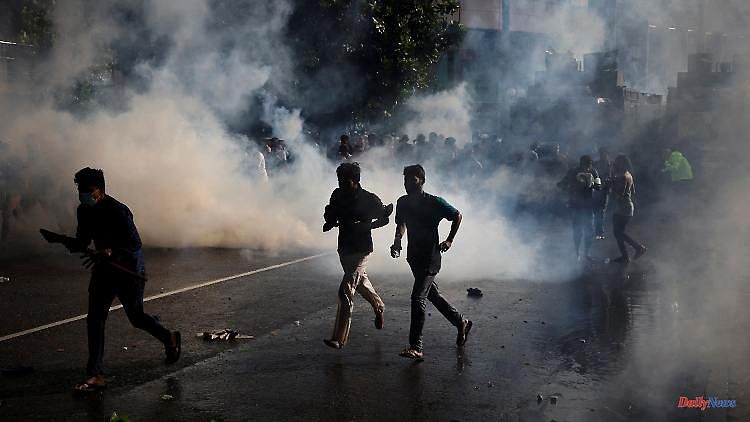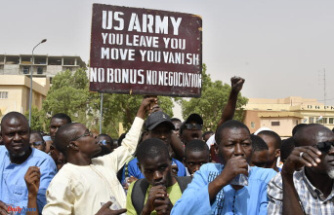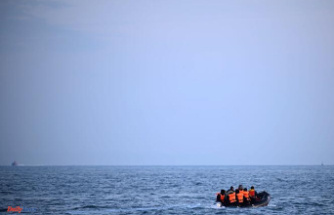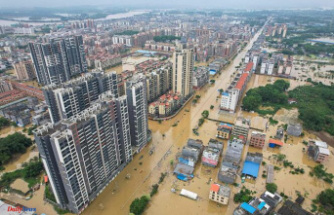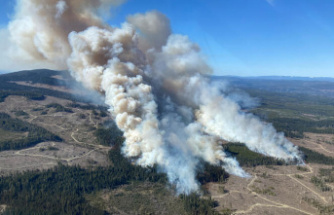The prices for fertilizer and fuel are rising sharply, not only in Sri Lanka causing huge problems. Export restrictions exacerbate the situation in many countries. Now the fear of unrest is growing.
Sri Lanka's president brushes off calls for his resignation and responds with an order to shoot at looters. Under pressure from the streets, his government resigned and he replaced the head of government. But the Asian country continues to stagger into political chaos. Despite the curfew, starving people in the capital set fire to ministers' villas, set cars on fire and attack overwhelmed police officers - at least that's what was communicated on Twitter.
Sri Lanka is heading for a food crisis - the causes are complex and partly home-made. But Vladimir Putin's war of aggression in Ukraine has pushed up energy and agricultural prices around the world. With the smoldering economic crisis, this results in an explosive mixture: The state is so over-indebted that it could still pay for energy imports for a month with the remaining foreign currency reserves in the double-digit million dollar range. In desperation, President Gutabay Rajapaksa negotiated an oil loan with India. But then?
The lack of fuel, which has been increasing for months, is not only affecting dealers and service providers. Farmers also lack diesel for tractors. In any case, her income had shrunk after the government banned the use of artificial fertilizers a year ago. The consequences are only now becoming really clear: the rice yield fell by half a million to 2.9 million tons in 2021. Smaller harvests also mean less funds for the beginning planting season.
On the tropical island, many farmers cultivate the land with rice and bananas - usually in abundance. Without subsidized fertilizer, many farmers stopped growing; very few were prepared for a changeover. Officially, the ban was justified with an environmentally friendly change in agriculture. But critics suspect that the government is planning large-scale land grabs for foreign exchange-generating lease or purchase contracts - and that the failure of many small farmers is taken into account. Others explain the ban with high subsidy costs, which also eat up foreign exchange reserves. The war in Ukraine would make the import of artificial fertilizer even more expensive.
The International Crisis Group, an organization that monitors political risks, describes what is contributing to the escalation in Sri Lanka as the "Ukraine effect". The country would be in an economic crisis even without the invasion of Ukraine, Ukraine's expert Alan Keenan told the Washington Post. However, the war is making everything worse: "Due to the Ukraine effect, a loan that would have sufficed for two months of fuel imports is now only enough for one month," he says. "Even if there were a debt relief: Less food, less fuel, less medicines will be imported."
The situation is critical. Farmers who have harvested a quarter less on average can no longer afford fuel. At the same time, the costs of the supply routes from the countryside to the cities are rising: food prices have increased by around 50 percent. Wholesale markets report that chili peppers are 40 percent more expensive than the previous year, okra by 50 percent, potatoes by 60 percent and limes by 240 percent. There have been power cuts for months, and food will soon have to be imported. Cooking gas is also becoming unaffordable in some cases.
Rajapaksa had counted on Russians and Ukrainians, of all people, to boost sluggish tourism. In 2021 they made up a quarter of the visitors. In negotiations with the International Monetary Fund (IMF), the state bankruptcy is to be circumvented - so that at least oil imports can come into the country again, which not only keep mobility and industry running, but also 40 percent of electricity production. The government's main response to the political upheaval resulting from the economic chaos is to impose a state of emergency.
Meanwhile, disturbing images of looting in grocery stores in Iran have raised questions as to whether a series of unrest is on the horizon. One thing is clear: the dramatic rise in prices on the world market for fuel, fertilizer and grain is hitting developing countries hardest. Along with Sri Lanka, Zambia and Mozambique are on the brink of bankruptcy. The World Bank warns that 60 percent of low-income countries are over-indebted. Most depend on imports of food and energy. However, the state budgets are exhausted after the corona pandemic. Africa in particular has the first recession behind it in decades - and is struggling for financial leeway.
Cruel food prices were a catalyst for the Arab Spring a decade ago, warns Vera Songwe, Executive Director of the UN Economic Commission for Africa. She points to food inflation currently at 50 percent in Ethiopia. As a result of the Ukraine crisis, the IMF has lowered this year's growth prospects for the continent to 3.8 percent - too little for a recovery. Economists at Oxford Economics Africa also fear possible social unrest that could be sparked by unbearable living costs. Additional costs for meals and energy created a "volatile political environment" in the context of higher unemployment in the pandemic.
In Egypt and Nigeria, governments have postponed plans to phase out food and fuel subsidies. Morocco, Kenya and Benin increased their minimum wages. South Africa expanded unemployment benefits and suspended fuel taxes. Oxford Economics believes that unrest could be imminent where there is less leeway for spending - for example in Ghana and Tunisia. In Ghana, inflation recently climbed to an 18-year high, and the inflation rate for food at 26.6 percent. The rating agency Moody's counts Mozambique, Togo, Tunisia and Namibia among the risk countries due to high import dependency for energy and food, low income and social tensions - as well as Lebanon and Jordan in the Middle East.
Foreign Minister Annalena Baerbock expects the global number of hungry people to increase by 43 million, as she said after a G7 meeting under the German presidency. There is a risk of additional food insecurity worldwide. The G7 agriculture ministers want to fight against the bunkering of agricultural products by individual countries, which "lack of solidarity" leads to even higher prices. Stricter price monitoring should also cover means of production such as fertilizer.
A ban on the export of bread grain wheat recently announced by India has once again pushed up prices on the futures exchanges. India produces around 110 million tons annually. Meanwhile, around 20 million tons of stored grain are blocked in Ukraine. The question of how to get the coming harvest out of the country, which Kyiv estimates at around 40 million tons despite the war, remains unclear. The G7 want to help with that. But they are powerless against India's export ban - also to ensure their own food security - despite their appeal for open markets.
In addition to Russia (and Ukraine), experts on food policy from the IFPRI Institute in Washington have documented export restrictions from 17 other countries - including Turkey and Indonesia. Bans or restrictions affect 15 percent of all calories traded worldwide - 36 percent of all wheat exports and 78 percent of all sunflower oil exports.
The Food and Agriculture Organization (FAO) and the World Bank are observing the price shock on the agricultural product markets worldwide. According to the latest figures from the World Bank from early May, this price index is 41 percent higher than in January 2021. The prices for corn and wheat are 54 and 60 percent higher, respectively. Although the FAO index had stabilized in April, it recorded the largest jump ever recorded in March. IFPRI says the worst is far from over: The uncertainty triggered by the invasion will keep agricultural market prices above pre-war levels at least until the summer of 2023, if not until 2024, according to chief analyst Joe Faith.
This crisis is also being fueled by the rise in fertilizer prices, as major exporters include Russia and Belarus, which restrict exports. According to estimates, Africa will be able to produce 30 million tons less food because of a lack of fertilizers. Rice and corn harvests could fall by a third. The dependencies are pronounced: 22 countries on the continent also get their artificial fertilizer from the Black Sea region. Ethiopia or Sudan depend on it for up to 90 percent.
Moreover, in many African countries, fuel is not only more expensive, but also scarce. Queues at gas stations and increasing social resentment are evidence of this. Africa is losing out when it comes to supplies of oil and fuel because it only buys small quantities and traders prefer to collect the currently high prices from fast turnover in Asia. Eight oil-exporting countries will benefit from higher prices, but the continent's import costs will rise by $19 billion, the IMF warns. And in Africa, too, almost 40 percent of energy production depends on oil.
This text first appeared on "Capital"
6

